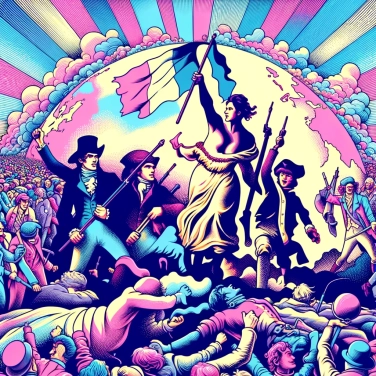The French Revolution had a huge impact as it inspired revolutionary movements in other countries, leading to major political, social, and cultural changes across Europe and the world.

Starting in 1789, France spread its rather explosive ideas all across Europe: individual liberty, equality among citizens, and a rejection of the absolute powers of kings. Very quickly, this resonated with neighboring countries, and many European peoples began to dream of a different way of living together, without the privileges of the nobility and the clergy. It's easy to understand why: when you're living poorly, you naturally want to look elsewhere for ideas. These concepts rapidly crossed borders thanks to books, newspapers, and especially discussions in popular cafés and clubs. Even the French armies, expanding across Europe under Napoleon, unwittingly helped to dismantle old systems and spread these revolutionary ideas everywhere. In short, the French Revolution served as a contagious model for those who wanted to shake up the established order elsewhere in Europe.
The French Revolution imposed the idea that leaders should govern with consideration for the popular will, radically changing the traditional model based on hereditary privileges. Several European countries saw the emergence of representative institutions such as Parliaments or National Assemblies, thereby limiting the absolute power of kings. Absolute monarchy took a significant hit across Europe. Even when it did not completely disappear, it had to make way for the concepts of constitution and separation of powers inspired by revolutionary ideas. These political changes, focused on the equality of citizens before the law, also gradually encouraged the development of universal suffrage in the following century.
The French Revolution gave rise to a series of powerful ideas, notably the right of peoples to self-determination. Essentially, each people, each nation, now wanted to decide its own destiny. Very quickly, these ideas crossed French borders and inspired various nationalist movements all over Europe, as well as in other regions of the world. For example, peoples subjected to empires or under colonial influence saw in this French revolutionary model the possibility of liberation. It boosted independence movements in Latin America, where revolutionaries like Simón Bolívar fought against Spanish domination to free several countries. In Europe as well, it had a ripple effect: peoples like the Greeks or the Belgians revolted to gain their independence a few decades later. The revolutionary idea was clear and appealing: why let a foreign power decide our future? In many regions, this simple questioning was enough to ignite the fuse and challenge the established order.
The French Revolution truly disrupted global trade, especially due to the multiple wars that followed. European trade exchanges were severely disrupted by conflicts, Napoleon's continental blockade, and customs barriers imposed everywhere. As a result, countries like Great Britain had to seek new markets elsewhere, particularly in Latin America and Asia. Furthermore, with the end of the privileges of the nobility and the clergy in France, a more dynamic bourgeois class emerged sustainably, focused on business, which would gradually influence the global economy. At the same time, the massive sale of the goods of the clergy and exiled nobles allowed for the emergence of a more dynamic real estate market, increasingly based on individual private ownership. All of this contributed to the gradual development of modern capitalism and liberal economic ideas in Europe and elsewhere in the world.
The Marseillaise, today the national anthem of France, was composed in a single night in 1792 by Rouget de Lisle and was originally a military song intended to encourage revolutionary troops against foreign invasion.
The decimal metric system that we use today in the majority of countries around the world was first adopted during the French Revolution in 1795 with the aim of unifying weights and measures, thereby facilitating trade and scientific exchanges.
The guillotine, associated with the Revolutionary Terror, was actually designed with a humanitarian spirit by Dr. Joseph-Ignace Guillotin, who sought a method of execution that was quick and equal, without excessive suffering.
Napoleon Bonaparte, who later became Emperor, took advantage of the upheavals caused by the Revolution to spread revolutionary ideals across the continent by promoting concepts such as legal equality and the end of feudalism, which would profoundly influence all of Europe.
The French Revolution spread the idea of national sovereignty and the right of peoples to self-determination. This stimulated various independence and national liberation movements across continental Europe throughout the 19th century, contributing to the shaping of the modern political map of Europe.
Among the notable economic consequences are the widespread removal of internal customs barriers, the standardization of measurement and currency systems, the disruption of maritime trade due to the Napoleonic military conflicts, as well as an acceleration of industrialization and capitalism in Western Europe.
Napoleon Bonaparte played a decisive role as his conquests facilitated a direct spread of revolutionary ideals across vast European territories. Although authoritarian, he implemented legal and administrative reforms inspired by revolutionary principles, particularly through the Civil Code, which had a lasting influence on European legal systems.
The French Revolution introduced and spread several major democratic principles such as human rights, popular sovereignty, the separation of powers, and the political representation of citizens. These political foundations continue to influence the functioning of many modern democracies around the world.
The main ideals include liberty, equality before the law, popular sovereignty, individual rights, and the abolition of privileges held by the aristocracy and the clergy, inspiring numerous revolutions and reforms in other European countries.

25% of respondents passed this quiz completely!
Question 1/4